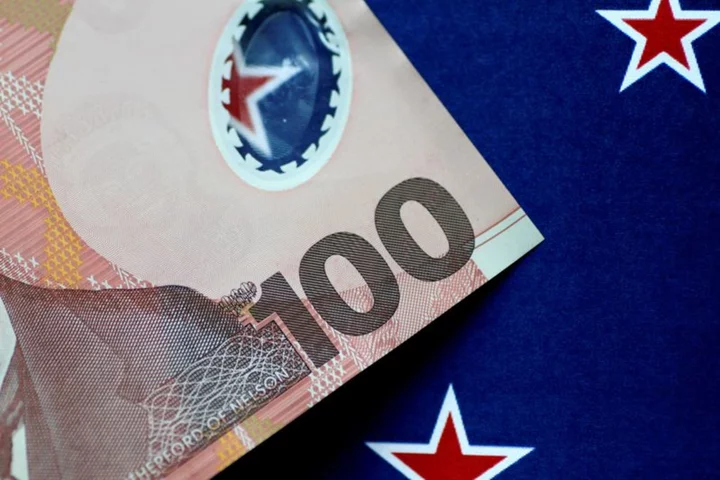By Rae Wee
SINGAPORE Japan's yen hit a one-week low against an insipid dollar on Wednesday as traders assessed the U.S. rate outlook, while the New Zealand currency spiked briefly after a higher-than-expected inflation reading pushed prospects of policy easing further out.
The dollar managed to nudge up after a mixed retail sales report overnight, with sales growth missing forecasts in June while consumers boosted or maintained spending elsewhere, pointing to consumer resilience that is likely to keep the economy on a solid growth path.
Against a basket of currencies, the U.S. dollar rebounded from a 15-month low hit in the previous session, with its index steadying around 100 in Asian trade.
"The (data) showed retail sales being resilient, and I think that's because the U.S. wage growth is still strong," said Tina Teng, market analyst at CMC Markets.
The Japanese yen fell marginally to 139.41 per dollar.
Bank of Japan Governor Kazuo Ueda said on Tuesday there was still some distance to sustainably achieve the central bank's 2% inflation target, signalling his resolve to maintain ultra-loose monetary policy for the time being, in contrast to the hawkishness at other major central banks.
The dollar has paused its steep decline from last week in the wake of a cooler-than-expected U.S. inflation reading that led to traders pricing in an imminent peak in Federal Reserve rates.
Economists polled by Reuters expect the Fed to deliver a 25-basis-point rate hike at its upcoming policy meeting this month, with a majority betting that will bring an end to the central bank's current monetary tightening cycle.
Across the Atlantic, European Central Bank (ECB) policymakers are also adopting a more dovish tone on the rate outlook, with governing council member Klaas Knot saying in an interview on Tuesday that the ECB will look closely for signs of inflation cooling in the coming months to avoid tightening policy excessively.
The euro was last steady at $1.1222, away from the previous session's 17-month peak of $1.1276.
Sterling bought $1.3016, ahead of UK inflation data due later on Wednesday.
"The stickiness of UK inflation measures has contrasted notably with price measures in both the euro zone and the U.S., which have been moving lower," said Rabobank's head of FX strategy Jane Foley.
"If the UK economy remains resilient, we expect that (the pound) is likely to react well to hawkish expectations regarding (Bank of England) policy.
"However, if recession risks rise in the UK, the pound may revert to pushing lower on rate rises as investors take fright on the overall UK economic backdrop and cut back their long (pound) positions."
In New Zealand, consumer inflation came in slightly above expectations in the second quarter, data out on Wednesday showed, causing a brief spike in the kiwi as traders pushed out expectations for when the Reserve Bank of New Zealand might start cutting its cash rate.
It was last 0.25% weaker at $0.6258, after jumping more than 0.6% to a session high of $0.6315 following the release.
"While inflation is 'lower', it is not 'low' by any stretch of the imagination. Importantly, measures of core inflation are continuing to run at rates of around 6%, and some have actually picked up in the June quarter," said Satish Ranchhod, senior economist at Westpac in New Zealand.
"That points to lingering strength in underlying price pressures."
The Australian dollar was last 0.4% lower at $0.6786.
(Reporting by Rae Wee; Editing by Shri Navaratnam and Sam Holmes)









